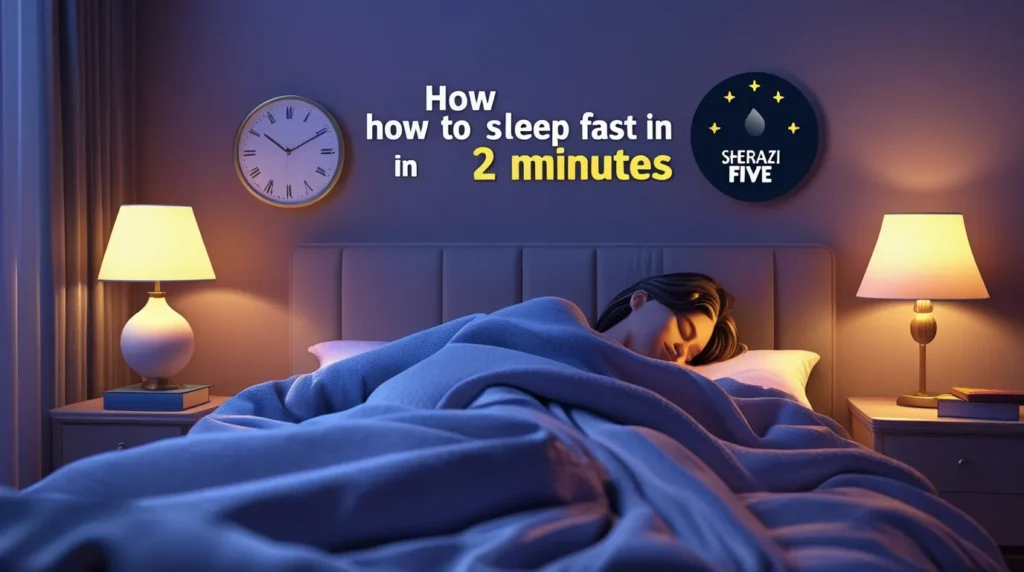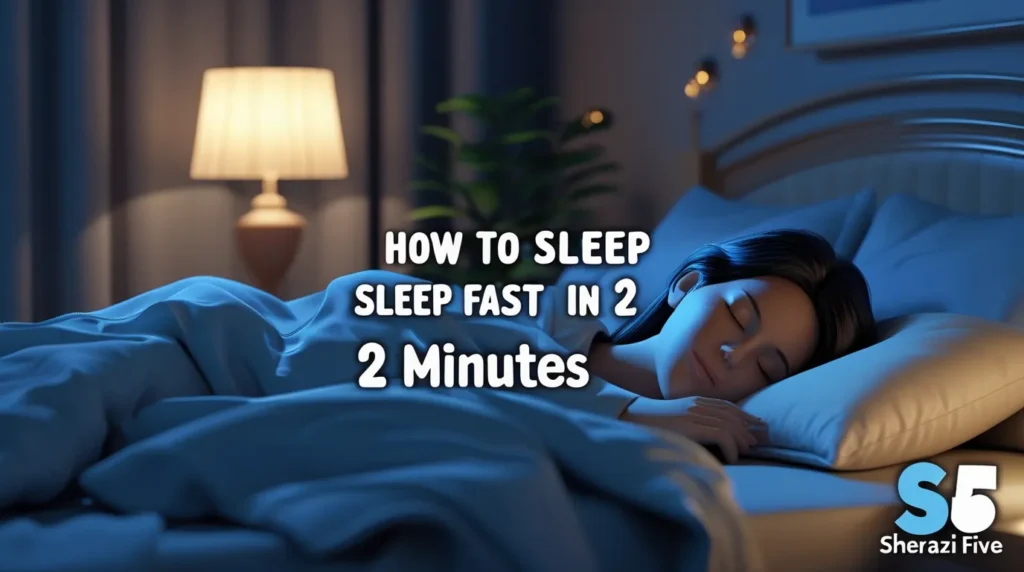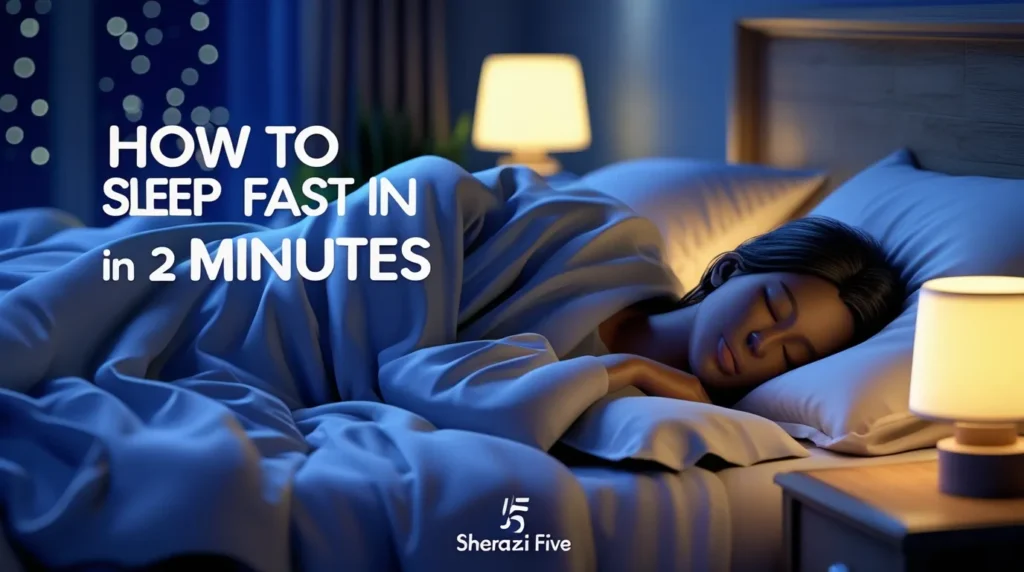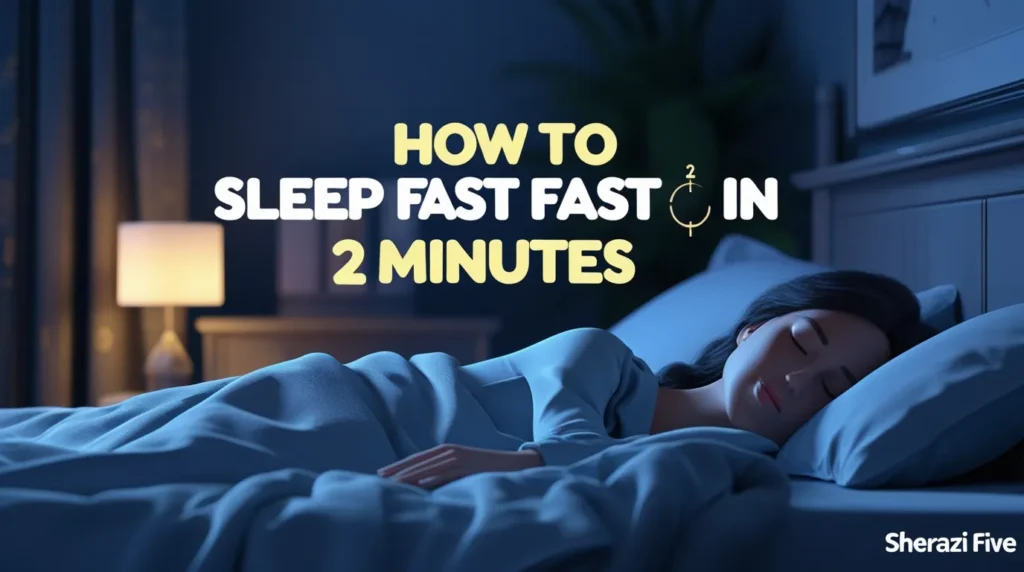Falling asleep quickly can feel impossible when your mind is racing or stress is high. Many people wonder how to sleep fast in 2 minutes, especially after long, exhausting days. The good news is that with the right relaxation techniques, understanding your circadian rhythm, and creating an optimal sleep environment, you can train your body to drift off almost instantly.
Simple strategies like deep breathing, meditation, and adjusting your bedtime routine make a huge difference. In this guide, we’ll explore proven methods, sleep-inducing foods, and lifestyle tips to help you finally enjoy restful nights and wake up refreshed every morning.
Introduction to Falling Asleep Quickly

Struggling to fall asleep is frustrating. You lie in bed staring at the ceiling, counting hours instead of sheep. Many wonder how to sleep fast in 2 minutes, and the secret lies in preparing both your mind and body. Small changes in habits, environment, and mindset can have a huge impact on sleep quality.
Why Sleep Matters for Your Health
Quality sleep is essential for your brain, body, and mood. It improves mental clarity, boosts energy, strengthens immunity, and helps regulate hormones. Ignoring sleep can lead to fatigue, stress, and even serious health problems like heart disease or diabetes. Prioritizing sleep is as important as diet and exercise.
Understanding the Science of Sleep

Sleep isn’t just rest—it’s a complex process with stages that restore your mind and body. Each night, your body cycles through REM sleep and deep sleep stages. Your circadian rhythm controls when you feel sleepy or awake. Hormones like melatonin signal your body it’s time to sleep. Understanding these cycles helps you design habits to fall asleep faster.
Prepare Your Mind and Body for Sleep
Relaxing your mind and body is key. Techniques like meditation, gentle stretching, and progressive muscle relaxation can calm your nervous system. By learning how to sleep fast in 2 minutes, you train your mind to switch from active thinking to restful relaxation, making it easier to drift off instantly.
Focusing on deep breathing and letting go of daily worries signals your body it’s time to rest. Even five minutes of focused relaxation before bed can make a noticeable difference in sleep quality.
The 2-Minute Sleep Method Explained

The 2-minute sleep method is a simple technique used by the military to fall asleep quickly. Start by relaxing your face, shoulders, and arms. Next, take slow, deep breaths, imagining your body sinking into the bed. Focus on clearing your mind of all thoughts.
Practice consistently, and you will learn how to sleep fast in 2 minutes, even in stressful environments. Many people find they can fall asleep almost immediately after mastering this technique.
Breathing Techniques to Fall Asleep Fast
Deep breathing is one of the fastest ways to calm your mind. The 4-7-8 breathing method involves inhaling for 4 seconds, holding for 7, and exhaling for 8. Box breathing, another effective method, follows a 4-4-4-4 pattern.
By practicing these exercises, you can significantly reduce anxiety and stress, making it easier to learn how to sleep fast in 2 minutes. Combining these techniques with relaxation exercises amplifies the effect.
Optimal Sleep Environment Tips
Your bedroom environment affects how fast you fall asleep. Keep your room cool, dark, and quiet. Use blackout curtains, sleep-friendly bedding, and ambient noise machines if needed. Avoid screens at least an hour before bed to reduce blue light exposure.
A well-designed sleep environment supports natural relaxation, making it easier to fall asleep faster and stay asleep longer.
Perfect! Here’s a table summarizing all the techniques to fall asleep in 2 minutes, designed for easy reading and SEO boost. You can place it anywhere in your article, preferably after the “The 2-Minute Sleep Method Explained” section.
| Technique | How It Works | Tips for Best Results |
|---|---|---|
| 2-Minute Sleep Method | Relax face, shoulders, arms; breathe slowly; clear your mind | Practice nightly, focus on each body part, visualize calm |
| 4-7-8 Breathing | Inhale 4 sec, hold 7 sec, exhale 8 sec | Repeat 4 cycles, do before bed for instant relaxation |
| Box Breathing | Inhale 4 sec, hold 4 sec, exhale 4 sec, hold 4 sec | Helps reduce stress and calm nervous system |
| Progressive Muscle Relaxation | Tense and release muscles from toes to head | Focus on sensations, release tension fully |
| Optimal Sleep Environment | Cool, dark, quiet room with comfortable bedding | Use blackout curtains, ambient noise, and proper mattress |
| Sleep-Inducing Foods & Drinks | Herbal teas, magnesium-rich foods, tryptophan snacks | Avoid caffeine, sugar, alcohol before bedtime |
| Mindfulness & Meditation | Focus on breathing, let go of thoughts | Use apps or guided meditation for easier practice |
| Consistent Bedtime Routine | Regular sleep schedule, calming activities | Read, stretch, or practice gentle breathing every night |
(How to Sleep Fast in 2 Minutes)
Foods and Drinks That Help You Sleep
What you eat impacts how quickly you can fall asleep. Herbal teas like chamomile, magnesium-rich snacks, or foods containing tryptophan help induce relaxation. Avoid caffeine, alcohol, and sugar late in the day.
Including sleep-inducing foods in your diet can complement relaxation techniques and make it easier to practice the 2-minute sleep method effectively.
Lifestyle Habits for Faster Sleep
Healthy habits enhance sleep quality. Regular exercise, reducing screen time before bed, and maintaining a consistent bedtime help regulate your body clock. Create a calming nighttime routine, such as reading or gentle stretching.
These lifestyle habits make it much easier to learn how to sleep fast in 2 minutes, turning instant sleep into a natural habit rather than a rare occurrence.
Common Mistakes That Keep You Awake

Many people unknowingly sabotage their sleep. Overthinking, long daytime naps, late-night screens, or irregular sleep schedules disrupt your body’s rhythm. Avoiding these sleep disruptors is crucial.
Even small adjustments, like reducing evening screen time or setting a fixed bedtime, can significantly improve your ability to fall asleep quickly.
When to Seek Professional Help
If insomnia persists despite trying these methods, it may be time to consult a sleep specialist. Conditions like sleep apnea, restless leg syndrome, or chronic insomnia require professional evaluation. Sleep clinics and therapy can provide targeted strategies to help you sleep fast in 2 minutes safely.
Professional help ensures that underlying health issues don’t interfere with your sleep.
Healthy Lifestyle Habits for a Better Life
Conclusion
Falling asleep quickly is a skill you can learn with consistent practice. By combining relaxation techniques, proper breathing, optimal sleep environments, mindful eating, and healthy lifestyle habits, you will master how to sleep fast in 2 minutes naturally. Prioritize your sleep, and enjoy the benefits of better rest, energy, and overall well-being.
FAQs
1. How to fall asleep fast in 2 minutes?
Relax your body, clear your mind, and practice the 2-minute sleep method with deep breathing and visualization.
2. What is the CIA trick for sleep?
A military technique where you relax muscles, control breathing, and clear thoughts to fall asleep in about two minutes.
3. What is the 321 sleep method?
Focus on 3 deep breaths, 2 slow exhales, 1 mental relaxation to calm your body and fall asleep quickly.
4. How to do military sleep?
Relax face, shoulders, arms, breathe slowly, and visualize calm scenes while lying in bed.
5. How to sleep 😭?
Reduce stress, create a calm environment, and practice deep breathing or gentle stretches before bed.
6. How to sleep faster as a kid?
Keep a consistent bedtime, limit screens, and use calming routines like bedtime stories or soft music.
7. What is the 123 sleep rule?
Breathe in for 1 count, hold for 2, exhale for 3 to relax your nervous system before sleep.
8. How to sleep faster hack?
Dim lights, avoid screens, practice deep breathing, and focus on relaxing each part of your body.
9. How to have a 100 sleep score?
Follow regular sleep routines, limit caffeine, manage stress, and create an optimal sleep environment.
10. Can I cry in my sleep?
Yes, emotional release can occur in dreams or during REM sleep without fully waking up.
11. Does milk help you sleep?
Yes, warm milk contains tryptophan, which can promote relaxation and better sleep.
12. How to sleep 8 hours in 4 hours?
You can’t fully replace 8 hours, but techniques like power naps and polyphasic sleep can partially recharge energy.





Pingback: Unlocking The Secrets Of Sleep The Key To Better Health